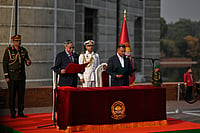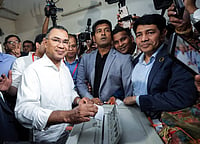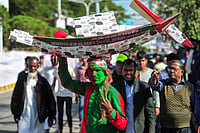“So, what do you need to do to become a good human being?” asked Laxmidhar Behera, the director of the Indian Institute of Technology (IIT), Mandi, to a group of students in an auditorium. “To stop meat-eating,” he himself answered.
He then visibly forced students to take a pledge to never consume meat, arguing that consuming meat triggered natural disasters. Ornamenting his speech with scientific jargon, he unleashed a most unscientific idea.
“Himachal Pradesh will have a significant downfall if the innocent animals are not (saved from being) butchered. You are butchering those innocent animals. That has a symbiotic relationship with the degradation of the environment, which you cannot see now but it will have (an effect). It is having. The mass-scale landslide and so many other things… cloudbursts that you see again and again… these are all effects of this cruelty,” a video clip that went viral on social media platforms shows him saying.
This became the latest entrant in India’s Hall of Shame of unscientific claims promoted by scientists occupying high chairs of authority.
Himachal is a state where development activities have erased thousands of hectares of forests, hydropower dams have blocked riverine flow, and ever-expanding roadways and concrete infrastructure are believed to have increased the risks of landslides and land subsidence. Climatic changes have only worsened matters, increasing risks from cloudbursts and possible glacial lake outburst floods.
As a result, voices questioning the mode of development are getting louder over the past few years. There have been consistent demands from environmentalists, scientists, and local residents to think afresh about large infrastructure projects in this fragile region. Scientists are also engaged in finding ways to mitigate the crisis.
For Behera, the solution is simple. He asked the students, not once but thrice, to say in unison and louder each time, that they will not consume meat.
There are many religious and social beliefs in the world that advocate vegetarianism. This essay is not about the merits or demerits of any food habit. This is about the misuse of the platform of a science institution to spread beliefs unrelated to science.
Behera’s comments are not only an attempt to whitewash the ill effects of government policies but also a deplorable way of imposing one’s personal food habits on young children coming from diverse backgrounds. It is also an insult to scientists and researchers at his own institute engaged in improving methods for landslide susceptibility mapping for better prediction and creating devices to give early warning for water-triggered landslides.
Among the current scientific projects at IIT Mandi, scientists are engaged in research and development related to natural disasters with a funding support of at least Rs 3.4 crore.
Does his comments justify the IIT Mandi’s funding of Rs 15 lakh each for research on the geotechnical aspects and the hydrological aspects of climatic change's impact on landslide risks in the Himalayan region? The department of science and technology of the Union government is funding the development of a low-cost, micro-electro-mechanical system (MEMS)-based monitoring and early warning system for rainfall-induced landslides with Rs 40 lakh.
The District Disaster Management Authority (DDMA) of Kangra has allotted Rs 50 lakh to an IIT Mandi project for the development and deployment of low-cost landslide monitoring solutions in Kangra district. ISRO has allotted to IIT Mandi scientists Rs 40 lakh for probabilistic multi–hazard analysis for earthquake and earthquake-induced landslides with regard to Shimla, Mandi, and Manali.
Asia Pacific Network for Global Change Research is funding research with Rs 74.5 lakh to understand the influences of monsoon variability and compound extremes.
The DDMA of Mandi is funding the development of a remote sensing data-enabled landslide response system with Rs 55.88 lakh and another project with Rs 49.2 lakh for the deployment of low-cost landslide monitoring and warning systems.
It would be futile to ask him why all this money is going to research that Behera himself considers futile.
But his is not an isolated case. In 2019, Andhra University vice-chancellor Gollapalli Nageswara Rao claimed, from the platform of the Indian Science Congress, that the Mahabharata epic carried proof of ancient India’s knowledge of in vitro fertilization and stem cells. Earlier this year, an Indian Space Research Organisation (ISRO) helmsman claimed Vedic people knew how to make aircraft.
Besides, cow science has emerged as the new kid on the block. Scientists at IIT Bombay claimed that curd made from milk of a pure Indian cow breed is more beneficial. IIT Guwahati hosted a whole national seminar on cow science. IIT Palakkad received funds from the department of science and technology for ‘Scientific Utilization through Research Augmentation - Prime Products from Indigenous Cows’.
Behera may have taken inspiration from these developments and also the cow science syllabus that the University Grants Commission (UGC) circulated in 2021. The UGC had asked all universities across the country to “encourage” their students to take the ‘Kamdhenu Gau Vigyan Prachar-Prasar Examination’ open to students of schools and colleges and even the public.
Its syllabus included a chapter titled ‘Cow Slaughter, Catastrophes and Earthquakes-An Interrelationship’, which equated the laws of gravity and that of ‘every action has an equal and opposite reaction’ with the ‘laws of Karma’ of the Vedas.
The chapter claimed that “physicists M M Bajaj, Ibrahim, and Vijayraj Singh have proposed the theory that animal slaughter and natural calamities like earthquakes have an interrelationship.” It hypothyses “large-scale abattoir activity as the causative agent for major earthquakes.”
“Their theory makes an interesting reading because science still does not have proper answers as to why earthquakes happen and how they can be predicted with reasonable accuracy. This theory is being hailed for filling the gaps in the science of seismology, still a nascent science,” claimed the chapter in the syllabus.
If this was not outlandish enough, the syllabus added that the theory “critically examines” the “origin of earthquakes due to the interaction of nociception waves (the waves generated by the animals on the verge of being butchered) with gravity waves.”
This ‘nociception’ wave supposedly impacts the splitting of ‘shear wave’, which in turn is ‘linked to ‘seismic anisotropy’. “This splitting is associated with the cracks in the crust aligned by stress,” it said.
This creative mix of fantasy with seismological terms may stun scientists, unable to decide whether to mourn, agitate, be amused, or break out in laughter.
One may ask, if slaughterhouses cause earthquakes, why Gujarat, one of India’s predominantly vegetarian states, records one of India’s worst earthquakes? Or, if the sound of dying animals can impact the crust and tectonic plates lying way below the surface of the earth, then how disastrous would the noise be from drilling and blasting mountains for building mega infrastructure?
Such questions, though, are unlikely to interest Behera and his ilk. When ruling party politicians of a wide range - from Prime Minister Narendra Modi to ministers in the Union and state governments – have made a series of unscientific claims like Lord Ganesha being proof of plastic surgery in ancient India and desi (indigenous) cow’s urine containing gold, the superstitious beliefs among the scientists have seemingly seen opportunities for making giant leaps in their careers.
They appear too eager to be the right person at the right time to occupy the right chairs to be concerned about the credibility of their words, or anything else for that matter.






















